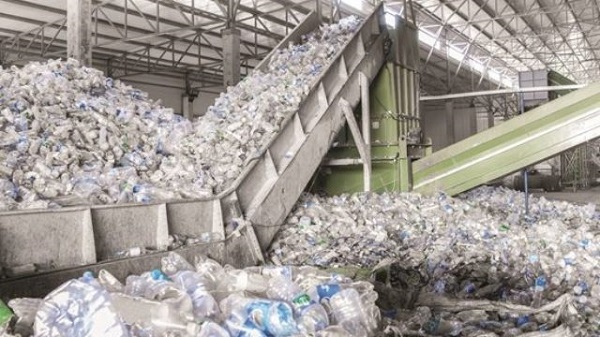
Plastic waste is a major global environmental problem as its huge production has drastically increased by more than 20-folds between 1964 and 2015, with an annual output of 322 million metric tonnes, which is expected to double by 2035 and quadruple by 2050 if no action is taken. The mismanaged waste, mostly originating from human use, is not only contaminating land but the marine environment, as well, polluting it and threatening biodiversity balance while also negatively impacting the blue economy.
Mismanaged plastics and inadequate waste management is also a source of greenhouse gas (GHG) emissions.
According to the World Bank, plastic waste accounts for 12 per cent of the total amount of municipal solid waste generated globally in 2016, with only 9 per cent recycled and 14 per cent collected for recycling.
As the most populated nation with the largest GDP on the African continent, Nigeria shares the ‘plastic’ problem with its increasing consumption from 578,000 tonnes of plastics in 2007 to about 1,250,000 tonnes by 2017. Per capita, plastic consumption has grown by 5 per cent annually from 4.0kg to 6.5kg, respectively. It is estimated that each citizen is utilising 7.5kg of plastics.
To help the nation tackle this challenge, between 2020 and 2021, the United Nations Industrial Development Organisation (UNIDO) and the Japanese government collaborated to support the Nigerian government in developing plastics value-chain assessment through the project “Study on available sustainable alternative materials to plastics, and innovative packaging and recycling technologies that meet market needs in Africa to reduce plastic leakages to the environment”. This study focused majorly on Lagos State and the Federal Capital Territory (FCT), Abuja.
As a sequel to that study, UNIDO, the Nigerian government through the Federal Ministry of Environment and the government of Japan recently signed another project agreement “Promoting Sustainable Plastic Value Chain Through Circular Economy Practices”, to promote the economic and social development of Nigeria.
Speaking during the ceremony in Abuja, the Minister of State for Environment, Barr. Sharon Ikeazor, said the large volume of plastic waste being generated in the country presents circular economic business opportunities across the plastic value chain which should be properly harnessed for job/wealth creation, establishment of micro, small and medium-scale enterprises, private sector investment including foreign direct investment in addition to preventing/reducing plastic leakages to the environment.
She said the ministry must, therefore, take proactive measures to promote, institutionalise and entrench sound circular economic principles and practices in the country.
“Nigeria’s circular economy potentials can be seen in its large and thriving waste management sector that attracts operators, due to the high volume of wastes and demand for recycled materials. One of the ways to realise this potential is to support the industry by demonstrating the benefits of adopting circular economy practices with innovative technologies, including recycling technology or alternative material production.
“This is exactly what this project whose objective is to promote the integration of circular economy principles and practices into plastic waste management, strengthen plastic value chains, demonstrate the benefits of adopting circular economy practices and resource-efficient production of plastic value chains in Nigeria, is designed to achieve. This project would, therefore, complement the efforts of our government in mainstreaming circular economy principles and practices into our national development plans,” she stated.
In his remarks, the UNIDO representative and regional director, Nigeria regional office hub, Mr. Jean Bakole, explained that the project collaboratively carried out by UNIDO and the government of Japan will help in the socio-economic development of Nigeria.
He said the project, funded by the government of Japan and implemented by the UNIDO and Nigeria through the Federal Ministry of Environment, would focus mainly on Lagos and the Federal Capital Territory (FCT), Abuja.
“Through the project, we also hope to develop national and states’ implementation guidelines for the National Policy on Plastics Waste Management, strengthen recycling value-chains in selected municipalities in Lagos, FCT and technology demonstration of circular economy and resource-efficient practices,” he added.
Earlier, the Ambassador of Japan to Nigeria, Matsunaga Kazuyoshi, said Japan is committing $3m to the government to promote a sustainable plastic value chain through circular economic practices because of its commitment to promoting a better eco-system, stressing that what affects Nigeria affects Japan, too.
He restated that Japan hopes to contribute to the development of the blue economy, as well as the prosperity of Nigeria, adding that it plans to achieve this through the multi-faceted project of contribution to environment conservation and contribution to the new economic growth.
Given the expected outcome of the project expected to run for 36 months from 2022 to 2025, an environment expert with the UNIDO regional office, Oluyomi Banjo, in his presentation, said circular economic principles and practices are integrated into the effective implementation of plastic waste management, and the recycling capacity of plastic value chains are strengthened, so that the number of plastics leaking to the environment can be reduced.
He listed the main counterparts of the project to include the Federal Ministry of Environment while the key partners are the Federal Ministry of Commerce, Trade and Industry; National Environmental Standards, Regulations and Enforcement Agency (NESREA); Abuja Environmental Protection Board (AEPB), Lagos State Waste Management Authority (LAWMA) and the Lagos State Environmental Protection Agency (LASEPA) in cooperation with Manufacturers Association of Nigeria (MAN), Food and Beverages Recycling Alliance and the Waste Management Association of Nigeria (WAMASON).


